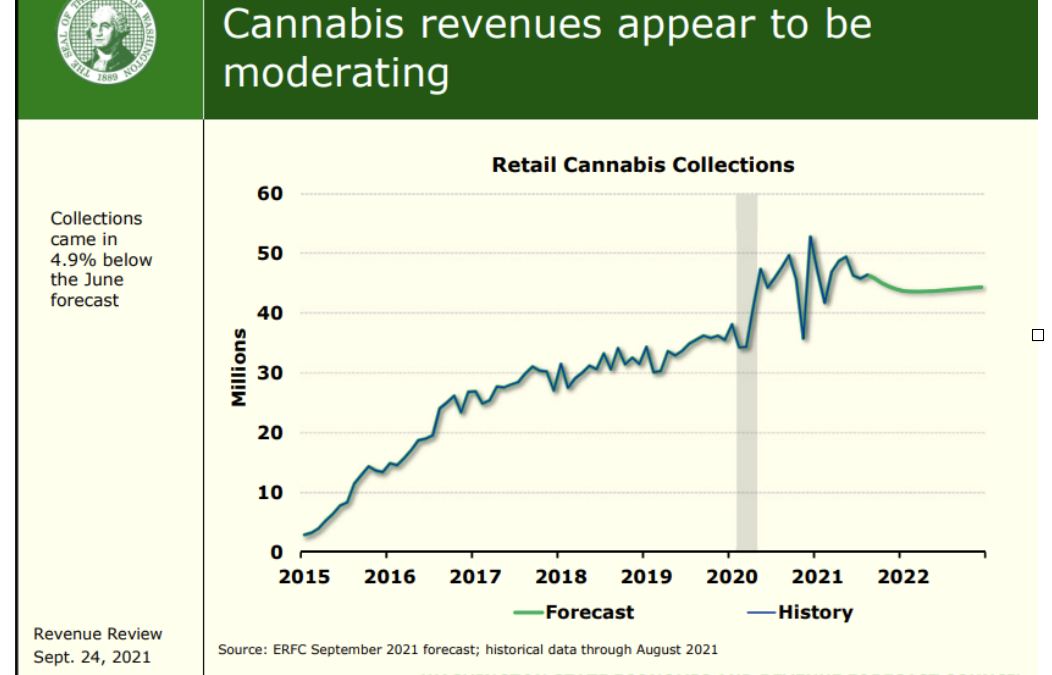Washington State Economic and Revenue Council just announced (9/24/2021) that state cannabis revenue is leveling off. Superficially, this may be obvious or a yawn, but in fact is a crucial and inevitable problem that I’ve been talking about for years. As a cannabinoid specialist physician, you might ask, why this is important to me and to my patients.
The answer is in research dollars which ultimately will affect my patients.
Since the beginning of the movement to legalize cannabis, first for medical use and now for recreational use, the industry has been positively giddy with excitement about all the money they can make. Frankly, state and local officials have been equally over-the-moon over the tax revenue. We’ve seen all sorts of business power-plays from buying up multi-state licenses to reverse take-overs to get listed on stock exchanges.
Throughout it all, the industry has maintained an unwritten stance that all of their customers, patients and recreational users alike, can be treated as recreational users. They see this as the easiest way to make money – in a system where advice is given freely by self-serving sales agents, products needn’t be shown to be safe or effective, and doctors are shown the door. Recognizing the power of language, industry advocates have even tried (mostly successfully) to insert the term Adult Use in place of recreational use. The implication is that adults can use cannabis for their healthcare, not just for fun, without any actual medical care.
Again, this serves their bottom line. The more people dabble with cannabis, the more weed the industry can sell. Further, the more people use higher amounts or stronger products, the more likely they are to develop problematic use. Like the old days when certain cola companies put cocaine in their soda, it’s a perfect product. The more you use, the more you use.
You can clearly hear that I’m pissed-off by this behavior.
All nefarious intentions of the greedy industry aside, for a moment, this is what they’ve gotten wrong: the medical market is vastly larger than the recreational one!
Estimates in the U.S. are that roughly 20-30 million Americans use cannabis recreationally. That’s a big number and you can see why cannabis companies would like to have a slice of that pie. However, the number of older (55+) Americans is between 115-130 million. Further, and sadly, every single one of those people will, not may, develop one or more illnesses that can be treated with cannabis. Whether it’s neuropathy or back pain or cancer or anxiety, we’re all going to get something.
This vast medical market is largely untapped. Sure my colleagues and I treat many, and sure there are some who will DIY their healthcare (seriously not recommended), but mainstream Americans (like grandma) are just not even being impacted by all this “revolution” around cannabis.
This is because the cannabis industry, with this “treat them all like recreational users” approach has a very serious credibility problem. Most Americans aren’t even listening. Most American physicians are struggling to take this seriously when they can’t write a prescription, see their patients being taken advantage of, and are hungering for good science to back up many of the claims this industry makes.
As the revenue from the recreational market plateaus, as we can see in WA, prices for cannabis will fall. As we’ve seen in OR, it will become harder for dispensaries to earn on what is no longer a special plant, but just a commodity like corn.
Smart companies are going to look to the future and find ways to do the research and develop real, better, and proven medicines from cannabis or based on what we learn about human physiology based on all this research. They recognize that the pharmaceutical industry, for all their warts, have made plenty of money while still adhering to strict regulation and providing intensely scrutinized, evidence-backed, reliable medications. Cannabis companies can too, and then they’ll be credible with mainstream patients and their physicians.
So, it’s a good thing to see that the recreational market is starting to saturate. As a result we’ll start to see more companies actually invest in doing proper science to meet the needs of real patients around the world.
Consult with a Qualified Boston Medical Marijuana Expert Today
Those considering using THC, CBD, or any type of medicine found in cannabis to help manage their condition should consider speaking to a trained medical expert who is knowledgeable about using cannabis therapeutically. Massachusetts medical marijuana doctor Jordan Tishler, M.D. sits on the faculty of Harvard Medical School and has years of experience helping patients treat pain and other ailments using cannabis. He and the team at InhaleMD stand ready to assist patients in determining whether medical marijuana is right for them. For more information, or to set up a virtual consultation with the team at InhaleMD, call us at (617) 477-8886 today.

